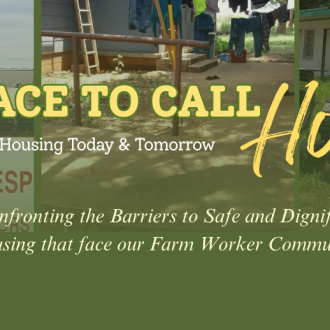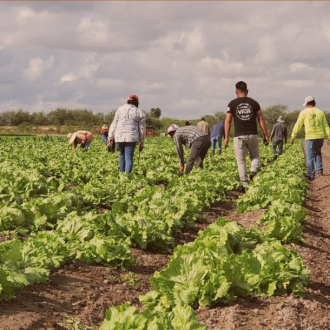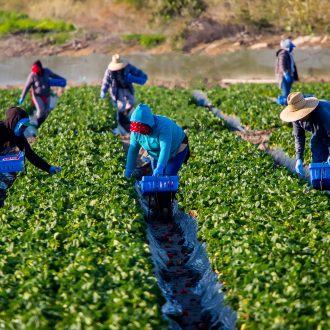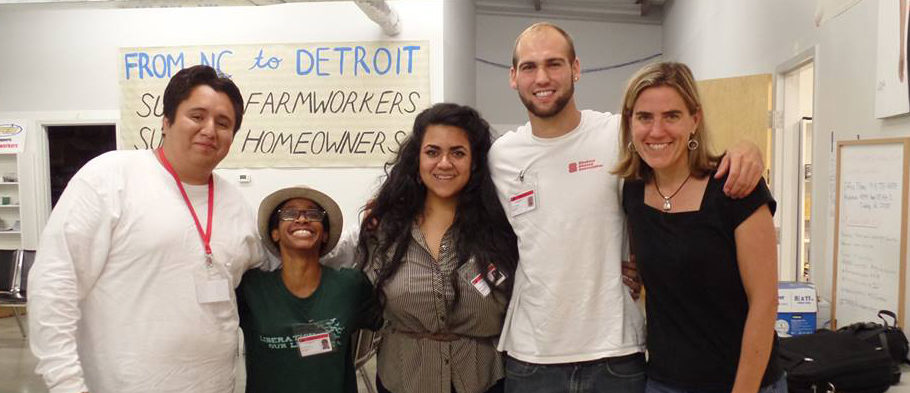
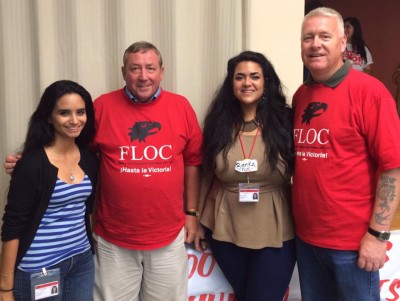 This summer, a group of 15 interns and myself had the opportunity to work on the Farm Labor Organizing Committee‘s Respect, Recognition, and Raise campaign.
This summer, a group of 15 interns and myself had the opportunity to work on the Farm Labor Organizing Committee‘s Respect, Recognition, and Raise campaign.
During FLOC’s 2013 Constitutional Convention, it was agreed upon to have a sign-up campaign to organize 5,000 more farm workers for the 2014 harvest season. Over the course of the summer, 16 interns, 3 apprentices, and a host of volunteers split up amongst different counties all over North Carolina to visit farm worker camps to sign folks with the union.
When I learned about the opportunity to organize farm workers with FLOC, I was excited and a little afraid to be perfectly honest. I was excited because my background is in labor, so what better experience than to have the opportunity to work with some of the most marginalized workers (who are excluded from federal labor rights) living in the United States. I was afraid because North Carolina is one of the least union-friendly states in the country, and the areas we would be visiting were remote and away from any kind of city life. I was born and raised in Miami; please understand my hesitation.
Shrugging off the latter, I decided to embark on what I can now describe as an incredible and emotional journey with some of the hardest working people I’ve ever had the pleasure of meeting. After a week long training in Washington D.C. through the AFL-CIO’s Union Summer program, the interns drove down to Dudley, North Carolina, for another few days of training. Throughout this period, we broke up into teams and counties, as well as learned how to find camps from the Department of Labor registered camp list. The biggest part of our training in North Carolina was learning how to do the rap in Spanish. A rap is basically an explanation of who the union is, what the union does, what the campaign is, how we’re going to reach our vision, and last is to ask the workers if they would like the opportunity to be a part of this movement.
All I could say was that I was NERVOUS my first night out going to camps. I’ll never forget the first camps that we went to. They were all undocumented camps in Sampson County, NC, with some of the worst living conditions that I had seen throughout my entire time in North Carolina. I met a group of men who told me that they split their crop earnings as a group. I was shocked when they told me they each earned a little over $100 dollars a week.
“How many hours do you think you worked this week?” “Maybe 50 or so,” was the response I was confronted with. After signing a few workers at this camp, collecting more stories, taking photos of bathrooms in terrible conditions, and finding out that these workers didn’t get breaks or clean water in the fields, our team decided to move to a camp about 50 yards away.
We weren’t even there for five minutes before a grower pulled up, blocked off our cars with his truck, and stepped out to berate us. He told us we were only there to steal the workers’ wages. What he meant by this was, in order to be a part of a union, a worker has to pay dues. The way that the grower was framing it to his employees, was that we were just taking 2.5% of their weekly earnings and not providing anything else. He went so far as to spit dip tobacco at our feet. Remember, all of this happened my first night visiting camps. This was also the first time that I realized how strong the intimidation is in the fields, and how difficult it would be to empower workers. This reaffirmed my decision to be there. “Pa’delante” I thought.
Each day in North Carolina was more insightful and eye-opening. Every morning during debriefs I heard another solemn story about something that happened to a worker, and every evening I became more impassioned to spread the message of empowerment. Community oriented unions like FLOC don’t exist as a form of organized charity for workers. They exist to show workers that regardless of documentation, whether they are contracted or not, they the workers are the backbone of North Carolina’s economy, and they deserve respect, and the right to fight for their rights in the incredible work that they do.
My big “ah-hah” moment was when I met this one woman named Elia. I noticed she was pregnant, so we quickly got into conversation about her pregnancy. Apart from other details, I learned that she was 9 months pregnant, and was due to give birth in just a few weeks. I asked her almost flippantly if she was still working in the tobacco fields. I honestly thought that she was going to tell me no, but to my gut-wrenching surprise she said yes.
My heart dropped in my chest, for a number of reasons. I knew this was an undocumented camp, and I already knew through other workers’ testimony at this camp that they did not receive breaks, clean water to drink in the fields, soap to wash the pesticides and chemicals off their hands, nor other form of protective equipment among other things. What I immediately put together was that she had been working with pesticides and chemicals throughout her entire pregnancy. I was so angry – however, I recognize that my anger doesn’t even compare to her reality. Every worker in the fields in North Carolina is working out of necessity. Each worker is there for the betterment of their families in one capacity or another. This is also a contributing factor for putting up with the conditions farm workers are living and working in. This is not to say that they are complacent, but the risk is clear.
Apart from visiting camps and signing up workers, FLOC also hosted and attended a number of events. The most notable was when the members of British Parliament came to listen to testimony from farm workers and to visit the camps themselves. It was important that British MP’s brought back their own eyewitness testimony to Europe to get British American Tobacco (the company that owns 40% of Reynolds American Tobacco) to put pressure on R.J. Reynolds. Additionally, our group of interns and apprentices played a huge role in setting up the members meeting for the North Carolina Growers Association (NCGA) affiliated farm-workers. This was a meeting where farm-workers in the union could see where FLOC was in the R.J. Reynolds campaign, and ask any questions they may have had.
The best parts of these meetings were the conversations on the car rides home with the farm workers. It was amazing to see workers, who were shy and introspective at first, sharing their stories and asking billions of questions about what constitutes wage theft, or the legality of something that had happened to them in the field.
One of the workers that I grew the closest to was named Maria. I think I became close to Maria because something about her reminded me of my mom. She was young, but her way of thinking is strong and emotive. I also knew she was going to be my favorite person on the planet after I visited her camp one evening and became so irritated by an older worker (different from Maria) who was speaking negatively about unions without letting me get a real word through. Needless to say, he ultimately decided not to join the union. After he left, she stepped up in front of her coworkers and proclaimed very loudly that she was going to be the first to sign-up.
Maria was born in Florida, but she told me the reason she was signing was because she wanted a better future for her friends and finance; all of whom are undocumented. The fields are dominated by men. It’s hard to come by women who are working in the fields, but whenever I did, they always seemed strong of spirit. I noticed that women were more likely to want to be a part of the movement building aspect of this campaign as well. The women we met were also less hesitant to speak to the members of Parliament and other media outlets like the New York Times. Maria was definitely not an exception to this observation.
After spending countless hours driving to camps (whether we found them or not is another story), getting stuck in the mud on multiple occasions, being barked at by dogs, blocked off by growers, battling mosquitoes, and not having cellular signal for three months, I can honestly say that what is happening in our agricultural sector needs to be at the forefront of any economic or labor decision we make. This is the most thankless occupation in our country and it is literally the most necessary.
There are also many things that I realized during my time in the fields that I have left out. I could write endlessly about every person I’ve met, every story told, every injustice I’ve witnessed, and every emotion I’ve felt working on this campaign, but I’ll consciously end with something I feel the most strongly about. People are not disposable because of their status, documentation, or lack thereof. These sisters, brothers, and people help to feed and nourish us every single day, and to explicitly exclude them from protections is disgusting and criminal.
Pa’delante y hasta la victoria no paramos! / Forward and until victory we won’t stop!
Bianka Salomon
Orlando YAYA

